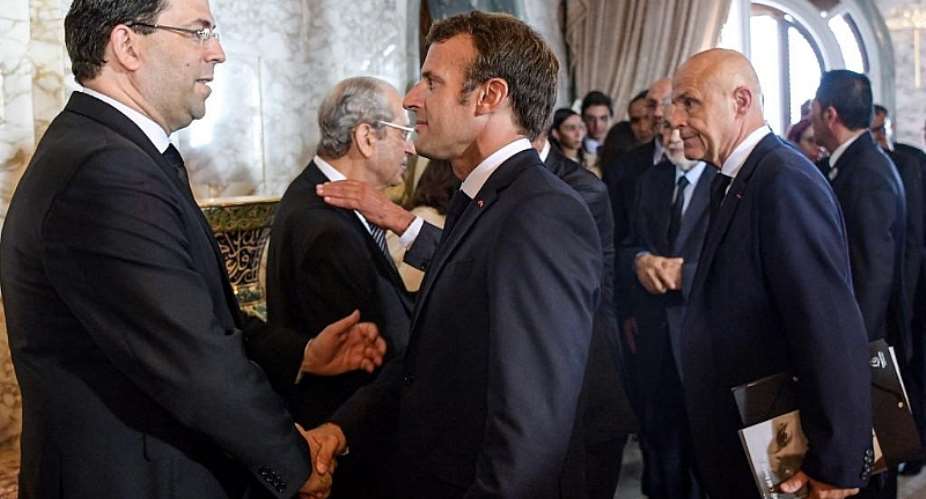Thousands of Tunisians have attended the funeral of president Beji Caid Essebsi, who died on Thursday at the age of 92. French President Emmanuel Macron and other foreign leaders travelled to Carthage palace to pay their last respects.
Thousands of Tunisians mourners lined the 20-kilometre road from the presidential palace in Carthage, where the body was laid in state, to the Djellaz cemetery in southern Tunis where Essebsi was buried.
Officers in full uniform carried the coffin draped in the Tunisian flag into a ceremonial room at the Carthage palace packed with dignitaries, placing it on a dais.
Essebsi is the first president to receive a state funeral since Tunisia gained its independence from France in 1956 and the government has declared seven days of mourning.
Parliament speaker Mohamed Ennaceur, who was sworn in as interim president hours after Essebsi's death, paid tribute to the late leader describing him as "the architect of national reconciliation".
"He was determined to successfully achieve democratic transition," in the birthplace of the Arab Spring uprisings.
Essebsi's widow and tearful family members were flanked by Macron, Spain's King Felipe VI, Qatar's Emir Sheikh Tamim bin Hamad Al-Thani, Palestinian president Mahmud Abbas and other regional and European leaders.
Macron hailed a leader who "in these times of threatening obscurantism... was keen on keeping Tunisia enlightened, tolerant and committed to universal values".
Filial connection
In his eulogy, Macron expressed the “friendship, affection and respect of the French people” for Tunisia and solidarity at this moment of mourning. He described Essebsi as a “man of battles and of conquests” but also one who showed “strength of character”.
"He taught me a lot," Macron added, saying he felt "a filial connection" with the deceased president.
Addressing Tunisians, he said: “You had a great president, a very great president, who knew how to hold on to both the accumulated wisdom of decades and a youthfulness that ceded nothing."
Essebsi's death triggered fears of political unrest in a country, which is now gearing up for a presidential election for September 15, and a parliamentary vote for October 6.
The coming elections will be the third set of polls in which Tunisians have been able to vote freely since the 2011 Arab Spring revolution.
Unfinished business
However, Essebsi's death comes amid unfinished business and a power struggle between Prime Minister Youssef Chahed and the president's son, that has led to the premier being sidelined from Nidaa Tounes to form his own rival party, Tahia Tounes.
The constitutional court has yet to be set up eight years after the Arab Spring, and an unprecedented bill which if passed by parliament would have given women equal inheritance rights as men.
Essebsi's poor health in recent weeks prevented him from rejecting or enacting an amended electoral code passed by parliament in June that would bar the way for several presidential candidates, including media magnate Nabil Karaoui.
Despite the uncertainty, Chahed hailed a "peaceful transfer of power", while interim leader Ennaceur vowed that "the state will continue to function".





 This IMANI job no dey pap; the people you are fighting for are always fighting y...
This IMANI job no dey pap; the people you are fighting for are always fighting y...
 Prof. Naana Opoku-Agyemang has changed; you can see a certain sense of urgency –...
Prof. Naana Opoku-Agyemang has changed; you can see a certain sense of urgency –...
 MFWA Executive Director slams Akoma FM for engaging in ‘irresponsible’ media pra...
MFWA Executive Director slams Akoma FM for engaging in ‘irresponsible’ media pra...
 ‘Women must become millionaires too’ — Prof Jane Naana on establishment of Women...
‘Women must become millionaires too’ — Prof Jane Naana on establishment of Women...
 Some believe only in Ghanaian votes, not Ghana — Kofi Asare jabs politicians
Some believe only in Ghanaian votes, not Ghana — Kofi Asare jabs politicians
 Plan to make BEST sole aggregator of Sentuo Oil Refinery will create market chal...
Plan to make BEST sole aggregator of Sentuo Oil Refinery will create market chal...
 2024 elections: I can't have the man I removed from office as my successor — Aku...
2024 elections: I can't have the man I removed from office as my successor — Aku...
 2024 Elections: Immediate-past NPP Germany Branch Chairman garners massive votes...
2024 Elections: Immediate-past NPP Germany Branch Chairman garners massive votes...
 Gov’t focused on making Ghana energy self-sufficient, eco-friendly – Akufo-Addo
Gov’t focused on making Ghana energy self-sufficient, eco-friendly – Akufo-Addo
 April 25: Cedi sells at GHS13.74 to $1, GHS13.14 on BoG interbank
April 25: Cedi sells at GHS13.74 to $1, GHS13.14 on BoG interbank
